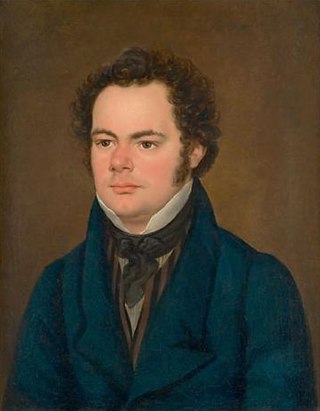The Bach-Werke-Verzeichnis is a catalogue of compositions by Johann Sebastian Bach. It was first published in 1950, edited by Wolfgang Schmieder. The catalogue's second edition appeared in 1990. An abbreviated version of that second edition, known as BWV2a, was published in 1998.
Manfred Siebald is a German singer-songwriter and lecturer in American studies in Mainz.

Der Zwerg is a lied for voice and piano by Franz Schubert, written in the mid-1820s on a text by Matthäus von Collin. The poem is in terza rima. In Otto Erich Deutsch's catalogue of Schubert's works, it is Op. 22, No. 1, D. 771.
Augustin Pfleger was a German Bohemian composer.

Frei.Wild is a German rock band from Brixen, South Tyrol, Italy. Its members belong to the German-speaking population of South Tyrol and their songs are mostly in German.

"Vom Himmel hoch, da komm ich her" is a hymn text relating to the Nativity of Jesus, written by Martin Luther in 1534. The hymn is most often sung to the melody, Zahn No. 346, which first appeared in a 1539 songbook and was probably also composed by Luther. This classic Christmas carol remains popular and has inspired many choral and organ works by other composers.

Philipp Poisel is a German singer-songwriter.
Franz Schubert's best-known music for the theatre is his incidental music for Rosamunde. Less successful were his many opera and Singspiel projects. On the other hand, some of his most popular Lieder, like "Gretchen am Spinnrade," were based on texts written for the theatre.

"Nun freut euch, lieben Christen g'mein", or “Dear Christians, One and All, Rejoice” in English, is a Lutheran hymn, written in 1523 by Martin Luther. It is one of Luther's early hymns and considered by some as one of his finest. It was published as one of eight songs in 1524 in the first Lutheran hymnal, the Achtliederbuch. The Achtliederbuch contained four songs by Luther, three by Speratus, and one by Justus Jonas. It appeared also in 1524 in the Erfurt Enchiridion.

Neues Geistliches Lied, abbreviated NGL, is a music genre of songs in German intended for church usage, and based on contemporary lyrics and with music by contemporary composers.

"Die Himmel rühmen des Ewigen Ehre", Op. 48/4, is a composition for voice and piano by Ludwig van Beethoven, setting the beginning of Christian Fürchtegott Gellert's poem "Die Ehre Gottes aus der Natur", a paraphrase of Psalm 19. Beethoven composed it as part of a collection of lieder on texts by Gelllert, which was published in 1803, known as Gellert Lieder. "Die Himmel rühmen des Ewigen Ehre" became famous in arrangements for choir, "Die Himmel rühmen!" by Joseph Dantonello and "The Heavens are Telling" by Virgil Thomson.
Friedrich Dörr was a German Catholic priest and professor of theology, who is known as a hymnwriter. He shaped the first common German Catholic hymnal, Gotteslob, published in 1975.

Hans-Jürgen Hufeisen is a German recorder player and composer.








